The Salvadorian Government is actively participating in the project Comprehensive initiatives to prevent violence in El Salvador, carried out by Interpeace in this country, providing political support and technical training to at-risk youth who are in the process of developing their own productive enterprises, as a way to improve their living conditions. Likewise, as part of Interpeace’s project in El Salvador, police officers, assigned to the beneficiary municipalities, will receive training on conflict transformation and peace culture. So far, the Ministries of Interior and Territorial Development, Justice and Public Security, Agriculture and Livestock, and Labor and Social Welfare, have been directly involved with Interpeace’s project, which is also aligned with the Government's programme: Plan El Salvador Seguro -PESS-, as it is also working in matters of prevention.
The Ministry of Interior and Territorial Development, have collaborated since the beginning of the project, by jointly defining the municipalities that would participate. In addition, they have supported the visibility and convening of the municipalities, for the management of the project. Within the framework of the PESS, the Ministry of Justice and Security, is coordinating the development of training sessions for the National Civil Police in the subject of peace culture, with the objective of raising awareness about alternative methods of conflict transformation, so that in this way, they can interact with the population in non-repressive ways. Moreover, the Ministry of Agriculture and Livestock initiated the implementation of training and technical support processes of the enterprises defined by the young participants. And finally, the Ministry of Labor, is providing training for the development of the business plans of these enterprises, to ensure that they will be carried out appropriately and achieve the results that the young participants have projected.
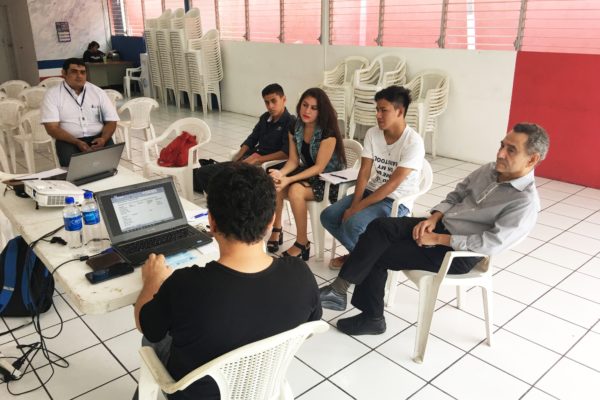
Workshop in Ilopango. Photo credit: Interpeace
The interaction between social actors is decisive for peacebuilding
With the financial support of the European Union, Interpeace has been implementing the project Comprehensive initiatives to prevent violence in El Salvador, which is being carried out in 10 municipalities with high rates of homicidal violence. The project’s objective is to generate productive opportunities for young people with the aim to favor local entrepreneurship through actions that result in the reduction of social risk to which they are exposed to by living in contexts of violence and crime.
For Interpeace, peacebuilding is only possible through the interaction between the different levels that make up a society, which is why, at the same time, the project contributes to the prevention of violence through participatory processes in three levels: community, local authorities and the National Government. At the community level, the project provides opportunities to at-risk youth, by supporting the development of entrepreneurships. At the level of local authorities, the project is developing a participatory model of violence prevention with a focus on peace culture, recognizing that inter-municipal coordination is essential to multiply the impact of their actions. And at the level of the National Government, the project is helping develop a relationship between local and national authorities, in the creation of joint actions on prevention, through its different units and according to their respective mandates.
Training as a tool for change
In the first stage of the project, the young participants received a training on conflict transformation, violence prevention and peace culture, and subsequently initiated the process of structuring their entrepreneurship proposals, which they have been perfecting in order to start their technical training to formalize their business plans.
As a sign of the commitment made by the National Government, there have been meetings with representatives of the ministries with the objective to coordinate the actions to be developed within the project and the scope of each collaboration. In addition, letters of understanding were signed, which reflect the details of each collaboration, both with the municipalities and the National Government.
Juan Barrera Salinas, the dispatch adviser to the Deputy Minister of Agriculture and Livestock, visited the project, in the municipalities of Zacatecoluca, San Vicente, Ilopango, Quezaltepeque and Nueva Concepción, with the technical team who will be responsible for the implementation of the training processes.
On this occasion, young people were able to present their entrepreneurship projects, clarify concerns and, the ministry team was able to interact with the participants and highlight the need to continue supporting projects that generate productive and work opportunities to improve living conditions and reduce the risk factors to which this population is exposed to.
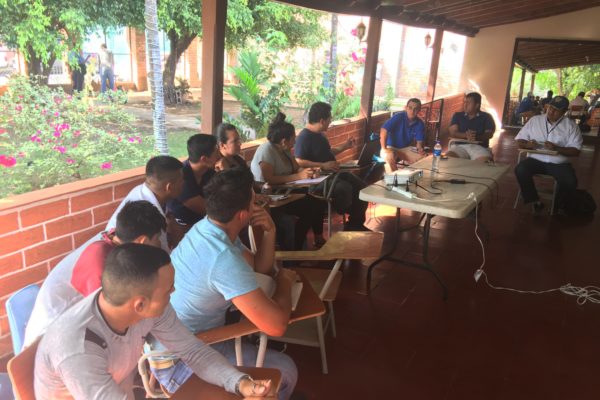
Workshop in Nueva Concepción. Photo credit: Interpeace
On International Women’s Day, we join with others in the international community to honour the milestones and progress made on the long road to gender equality.
International Women's Day celebrates the social, economic, cultural and political achievements of women around the world. It also reminds us of the courage, conviction, determination, talent and skill required to overcome the unique barriers that women face every day, all around the world.
In 2015, world leaders adopted the Sustainable Development Goals, placing gender equality and empowerment of women and girls at the heart of the 2030 Agenda for Sustainable Development. Upon taking office in December last year, António Guterres, UN Secretary-General, announced that “gender parity [would] become a clear priority from top to bottom in the UN”.[1] His commitment has given new energy to this issue and stimulated debate at the international level. Leadership movements, such as the International Gender Champions initiative, are also gathering momentum and pushing for action and accountability.
While these developments inspire hope, there is still a long way to go. Sadly, in these uncertain times, we find ourselves having to defend and protect the achievements of previous generations, rather than build upon them to get us all past the finish line of gender equality.
Women only hold 22% of legislative seats,[2] 17% of ministerial positions[3] and have made up only 4% of signatories to peace treaties in the last 20 years - all the while making up 50% of the global population.4 Women still earn 60-75% of men’s wages[4] for equal responsibilities.
Of course, the scope of gender issues encompasses much more than pay, leadership and political representation. Violence against women and girls, economic dis-empowerment, barriers to reproductive rights and disadvantageous legal standards that differentiate based on gender, all deserve urgent and serious attention. These are products of a complex system of power structures that can both liberate and oppress.
We must then ask ourselves, why, despite the numerous high-level pledges and gender initiatives, is progress so slow? Transforming commitments to gender equality from rhetoric into results remains a daunting challenge.
I strongly support the UN’s focus for this year’s International Women’s Day, “Women in the Changing World of Work: Planet 50-50 by 2030”.
As Interpeace continues to reflect on how we can do more for gender equality institutionally and in our peacebuilding work, I would like to share six areas that have proven effective in advancing gender parity in the workplace. These are key take-aways from the recent summit in Geneva entitled: ‘Breakthrough Barriers: Women in the Public Sphere’:
- Retention and performance – push for structured decision-making with clear and consistent criteria (men are often evaluated on the basis of ‘potential’ whereas women are evaluated based on past performance).
- Gender champions shape new gender champions – model gender-sensitive behaviour and mentor others to become informed and active in the gender parity movement; invest in mentoring gender-sensitive emerging leaders: the more female leaders mentoring men and the more male leaders mentoring women, the more inclusive the workplace becomes.
- Inspire and motivate women – involve and encourage women to take on challenging work that pushes them beyond their comfort zone.
- Set smart quotas in the workplace – quotas are key to helping achieve gender parity. The Summit concluded that quotas are more helpful than they are harmful.
- Measure and create accountability – establishing gender metrics and creating accountability frameworks around gender to accelerate the progress toward gender equity.
- Role models are important – recognize and praise behaviour that support gender equality at work; give visibility – internally and externally – to male and female leaders that model inclusive behaviour in the workplace.
We are often advised that the more strategic and effective approach to galvanize support for gender equality is to shift the conversation from “gender parity is the right thing to do”, to “gender parity is the smart thing to do”. The research and data are indeed compelling: diverse and inclusive teams deliver better results. That much we know. Gender equality is fundamental to achieving peace and progress. That much our peacebuilding work confirms.
At a more fundamental level however, I would assert that anything less than full equality for women is not progress. It is a refusal to acknowledge and honour women’s humanity and that women’s rights are human rights.
Scott M. Weber
Director-General, Interpeace
and International Gender Champion
[1] IPS News Agency, 13 December, 2016
[2] Inter-Parliamentary Union Women in Parliaments
[3] World Bank Gender Statistics
[4] UN Women
It is with an immense sense of loss that Interpeace announces the passing of Abdirahman Osman Raghe, a towering figure in the organization’s peacebuilding work in Somalia and the greater Horn of Africa.
Raghe was founding Director of Interpeace’s Somali programme and Deputy Director of the Somali programme of Interpeace’s forerunner, the War-Torn Societies Project (WSP). He spent over two decades with Interpeace in various capacities, and became one of the most important senior advisors. In 2013, he received a citation for his longstanding commitment to peace from Interpeace's Chairman Emeritus, former Ghanaian President John Kufuor.
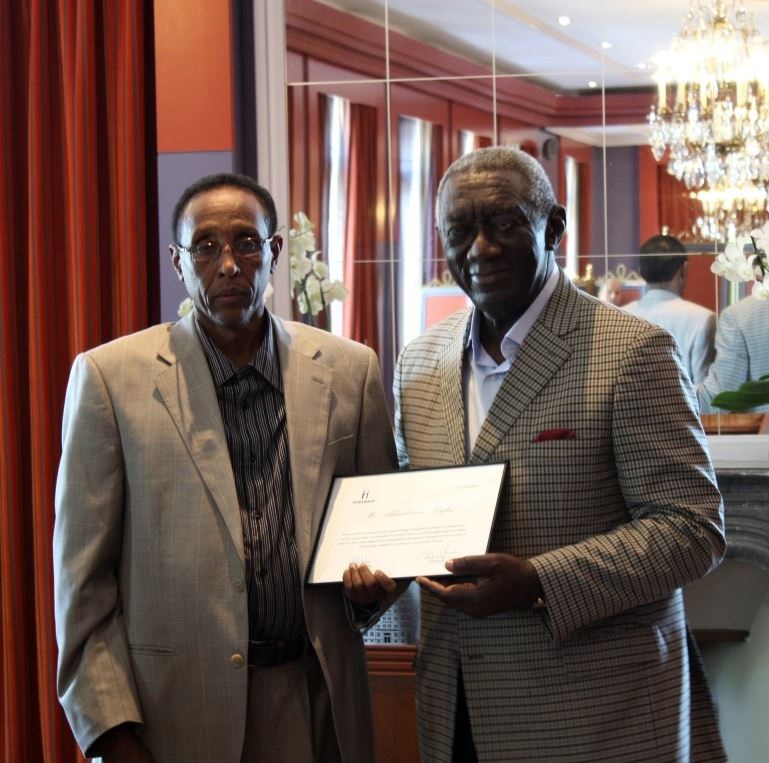
Raghe receives a citation for his longstanding commitment to peace from Interpeace's Chairman Emeritus former President John Kufuor of Ghana. Photo credit: Interpeace
Raghe’s personal history made him a uniquely knowledgeable, experienced, and respected observer of Somali development and political issues. In his earlier years, he had served as Permanent Secretary in Somalia’s Interior Ministry until 1989, and later worked for UNDP. He returned from Canada in 1998 to help rebuild the peace in his native Somalia, which had fallen into the throes of a complex civil war during his time away.
Various colleagues and friends from the Interpeace family have described Raghe as an extraordinary peacebuilder, an exemplary father, husband and a dear friend. Johan Svensson, Interpeace’s Senior Regional Advisor for Eastern and Central Africa, remembered the pivotal role that Raghe played in the establishment of Interpeace’s Somali programme, as well as his influence on Interpeace’s general direction as a peacebuilding organization.
“Raghe was a unique man. He guided the Somali programme to great achievements over the years and influenced Interpeace’s path globally,” Mr. Svensson said. “As an organization, Interpeace benefitted from his wisdom in many ways. We will miss him, but his legacy will remain.”
Interpeace’s Regional Director for Eastern and Central Africa (ECA), Jean Paul Mugiraneza, paid tribute to Raghe’s commitment to the cause of peace and his ever readiness to hold others by the hand and win them over to the cause.
“He was a mentor to many, a true peacebuilder whose legacy remains with all of us,” said Mr. Mugiraneza. “He was a strong and loving person who was loved and admired, in return, by a whole circle of people that he touched during his lifetime. I am grateful to be one of these people.”
Interpeace’s Director-General, Scott M. Weber, remembers how Raghe instilled inspiration and courage amongst his friends and colleagues.
“Many of us who grew professionally in Interpeace did so inspired by Raghe’s example and under his watchful eye," said Mr. Weber. "When Raghe spoke, we listened. And we learned. No matter what the subject, he always delivered his message with conviction and a deep sense of purpose but also with a hard-earned wisdom many of us may never achieve. If Interpeace were a village, he would have been one of our elders.”
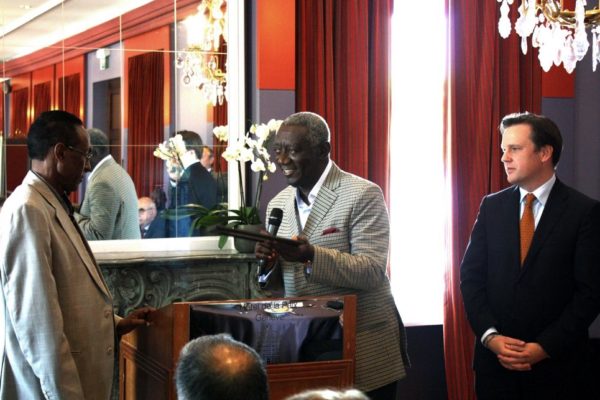
Raghe receives a citation for his longstanding commitment to peace from former President John Kufuor of Ghana with Director-General of Interpeace, Scott Weber. Photo credit: Interpeace
The entire Interpeace family extends its condolences to Raghe’s family, his many friends, colleagues and the entire Somali community.
UNICEF and Interpeace have the pleasure of inviting you to a panel discussion on 9 March, at the Palais des Nations on the margins of the 34th session of the Human Rights Council.
Ideology and the lack of employment opportunities for young people have long been portrayed as the primary root causes for youth violence. However, Interpeace’s research in Côte d’Ivoire and Mali, with the support of UNICEF, shows that these are only secondary factors and that youth’s violent acts are an expression of their need to find a place in society, to be recognized and valued.
The speakers will explore the origins of youth participation in new forms of violence and address the need for efforts to prevent youth violence in order to preserve the dignity of youth, in line with the Convention on the Rights of the Child.
If you would like to attend the event, please RSVP here: genevaliaisonoffice@unicef.org
All attendees without a UN ground badge are kindly requested to register at genevaliaisonoffice@unicef.org by 7 March 2017.
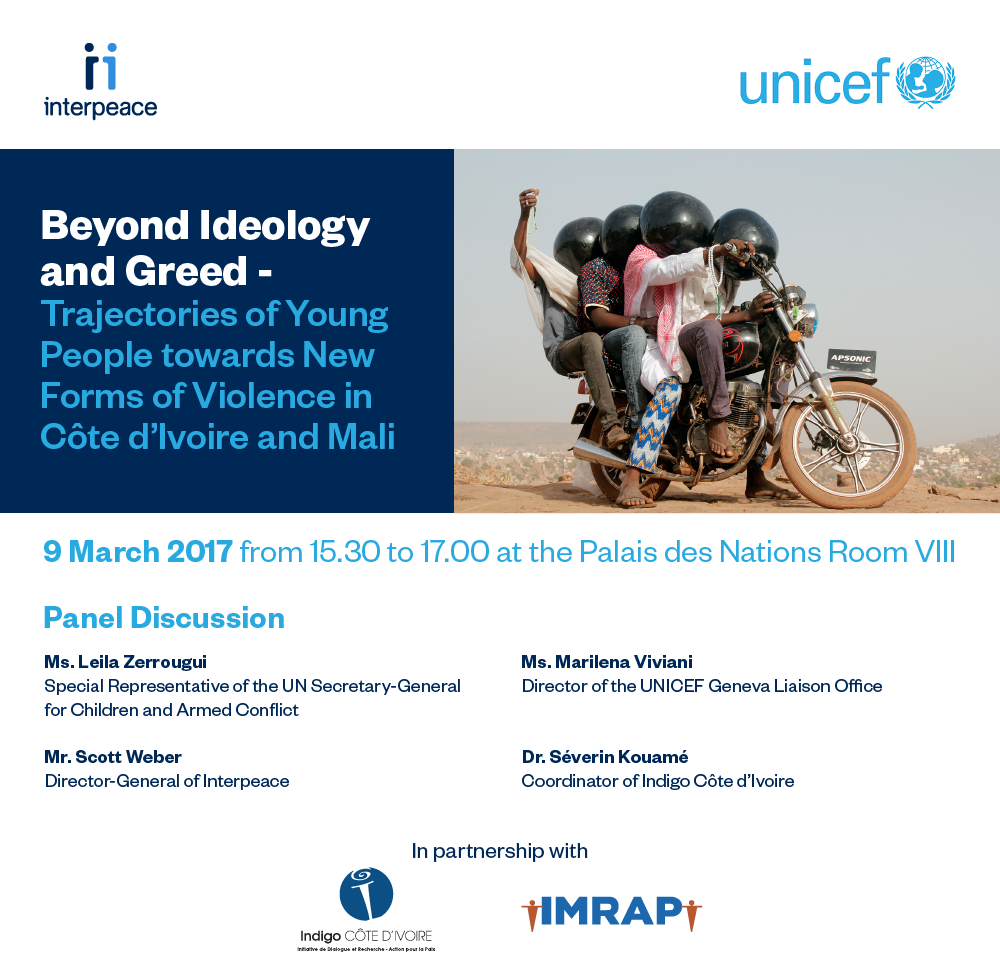
For more information about this research:
Read the Executive Summary here and the Report (in French) here.
Watch documentary film in French here and with English subtitles here.
We start the year with a great line-up for the Stockholm Peace Talks, to be held at Stockholm City Hall, on March 21st. Organized under the theme “Better Together”, a diverse group of speakers, including diplomats, athletes, activists and journalists, will share their personal stories and ideas on how to foster greater cohesion and inclusion in Sweden and abroad.
The speakers include:
- Staffan de Mistura, Special Envoy for Syria of the United Nations Secretary-General. Staffan has over 42 years of humanitarian work, serving in numerous conflict zones, directing complex relief operations, food distributions and vaccination campaigns.
- Selma Tengeborg, municipal Police Officer working in Skåne, in the south of Sweden. Selma joined the Stockholm Police Academy at the age of 24 and regularly engages with young people in special initiatives of crime prevention.
- Jeffrey Ige, Swedish Paralympic Champion. Jeffrey is a talented shot put athlete, who won the silver medal at the 2012 Summer Paralympics in London, and has become a model of integration through sports.
- Emilia Bjuggren, Vice Mayor of Stockholm. Emilia’s current areas of responsibility are labour market and sports policy, where she works to influence and change the society she lives in through equality and inclusion.
- Siavosh Derakhti, Swedish Social Activist, founder of Young People Against Anti-Semitism and Xenophobia. Siavosh has spread his message of equality and dignity to schools, businesses and civil society organizations throughout Sweden.
- Olof Skoog, Ambassador and Permanent Representative of Sweden to the United Nations in New York. Olof has extensive experience of multilateral and bilateral negotiations focusing on peace and security.
- Hédi Fried, Swedish author and psychologist dedicated to spreading the message of democracy to combat xenophobia, using her own experiences as a Holocaust survivor.
- Anton Abele, Activist, debater and politician, who became the youngest-ever Member of Swedish Parliament at only 18 years old. Anton founded the Stop Street Violence non-profit organization in 2008, which focuses on preventing youth violence.
The Stockholm Peace Talks will also feature two musical performances:
- Lilla Akademien, a Stockholm-based music school funded in 1994 to give pupils a solid musical foundation on which to build their lives. Lilla Akademien has become one of the most significant institutions for the education of young musicians in Scandinavia.
- Elin Rombo, Swedish opera soprano. Eli has performed at the: Frankfurt Opera, the Salzburg Festival and the Chicago Symphony Orchestra, amongst others. In November 2013, she was named Court Singer and in 2016 she was awarded the medal Litteris et Artibus by the Swedish King.
And the event will be co-hosted by:
- Alexandra Pascalidou, Award-winning writer, journalist, TV-and radio hostess, producer and a human rights advocate. She is a lecturer on democracy and diversity, pluralism and equality around Europe.
- Tomas Amanuel, Interpeace’s Local Facilitator in Sweden. Tomas grew up in Tensta, Stockholm, with an Eritrean background. He is an activist, social entrepreneur and role model for many youth in his community.
For full biographies of the speakers, click here.
The Stockholm Peace Talks is organised by Interpeace in collaboration with the City of Stockholm.
In the presence of Her Majesty Queen Silvia.
This event is made possible with the support of Ben & Jerry’s, the Swedish Post Lottery Foundation, the Embassy of Switzerland to Sweden and with the support of the Geneva Peacebuilding Platform.
Previous Peace Talks have been held at the United Nations offices in Geneva and Nairobi as well as at the Swedish Parliament, the Global Centre for Pluralism in Ottawa, and at City Hall in London. The Peace Talks were co-founded by the United Nations Office at Geneva, Interpeace and the Geneva Peacebuilding Platform with the support of the Swiss Government.
You can follow the Stockholm Peace Talks at #StockholmPeaceTalks and at the following link.
A webcast will be available to watch the Stockholm Peace Talks live. Stay tuned for more details.
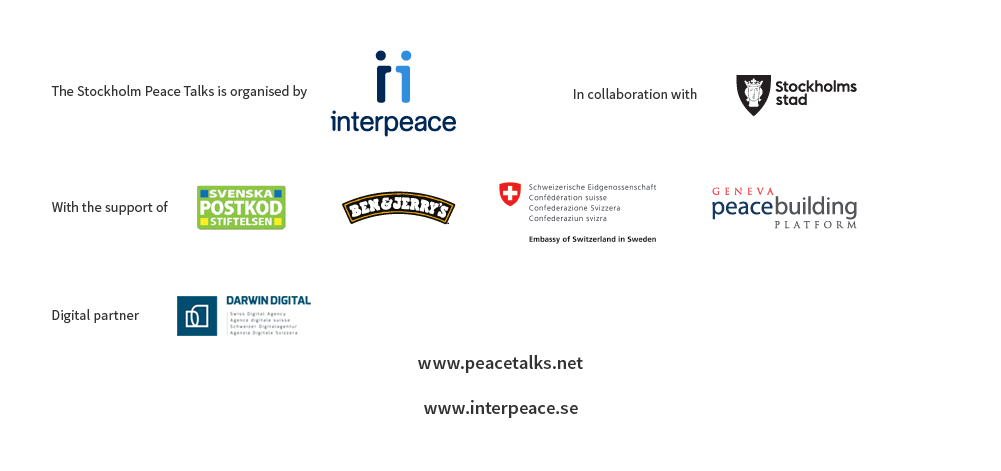
Interpeace’s Adivsory Council is a high-level statutory body that provides the organization with key strategic advice and guidance on peacebuilding policy and practice. It plays a key role in guiding the organization and serves as a testing ground for new ideas. The Advisory Council is made up of prominent governmental or intergovernmental individuals with extensive diplomatic experience in fields related to peace and security.
We are pleased to welcome two new members to the Advisory Council: Ambassador Terhi Hakala, Permanent Representative of Finland to the United Nations in Geneva and Ambassador Rosemary McCarney Permanent Representative of Canada to the United Nations and the Conference on Disarmament in Geneva.
Ambassador Hakala began her international career in the Finish Ministry of Foreign Affairs in 1988, she served as Head of the Organisation for Security Cooperation in Europe (OSCE) Mission to Georgia in 2007-2009 as well as Director General to the Department for Russia, Eastern Europe and Central Asia of the Ministry for Foreign Affairs in Finland.
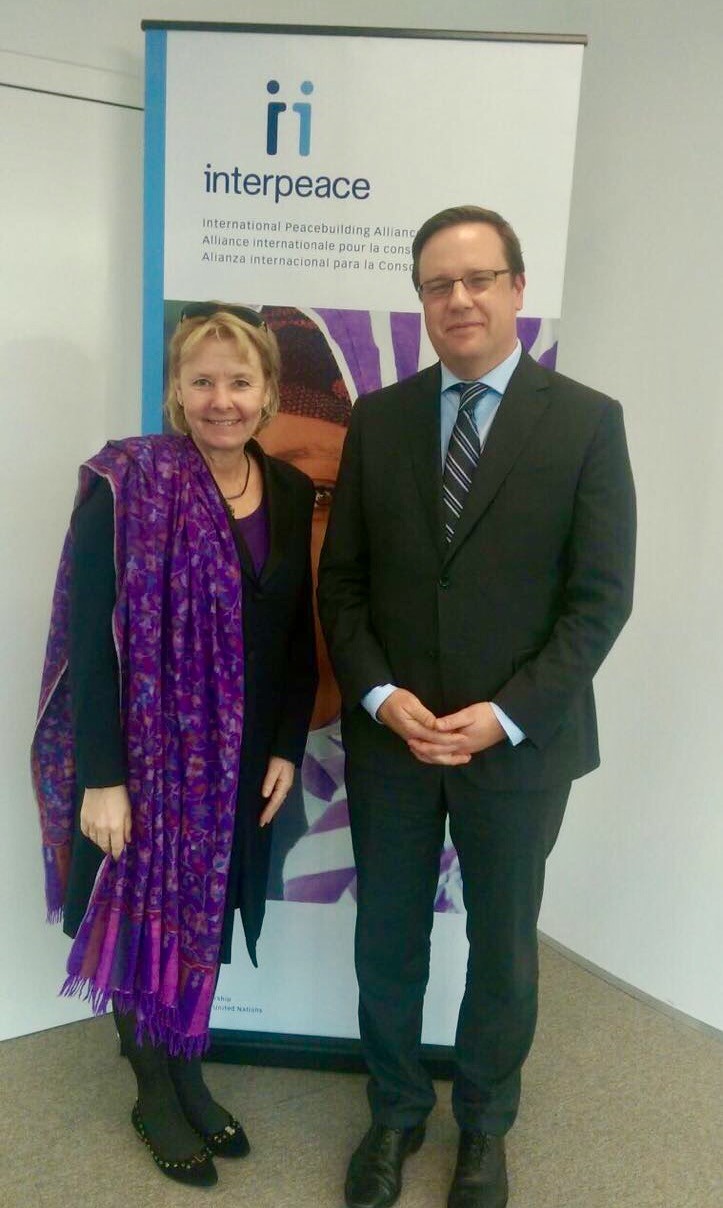
Ambassador Terhi Hakala, Permanent Representative of Finland to the United Nations in Geneva and Scott M. Weber, Director-General of Interpeace. Photo credit: Interpeace.
Ambassador McCarney is an award‐winning humanitarian, business leader, and an expert on international economic development. She has worked with the International Finance Corporation, USAID, World Bank and the Canadian International Development Agency, as well as with foreign governments and UN bodies.
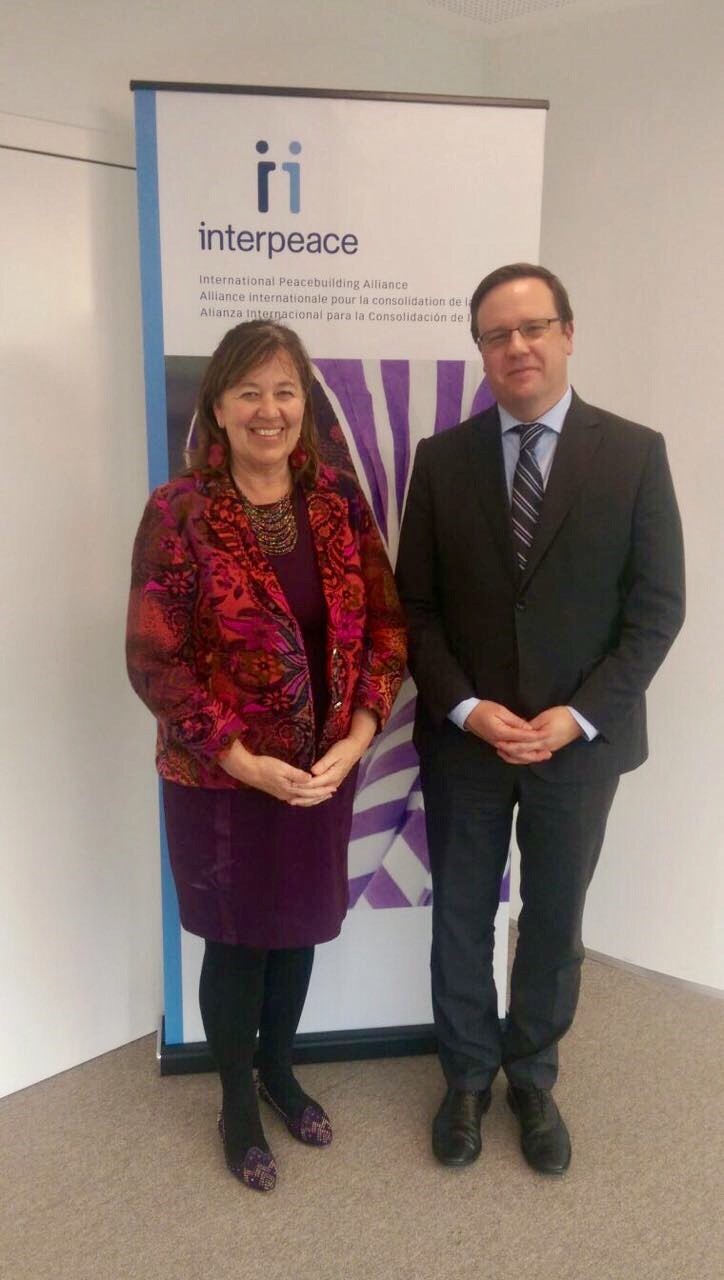
Ambassador Rosemary McCarney Permanent Representative of Canada to the United Nations and the Conference on Disarmament in Geneva and Scott M. Weber, Director-General of Interpeace. Photo credit: Interpeace.
The Interpeace Advisory Council meets twice a year. In its winter session held on 23 February, the council discussed several trends impacting the peace and security field. More particularly, they provided advice on how conflict prevention can be better incentivized among international policy making.
Learn more about the members of Interpeace's Advisory Council here.























